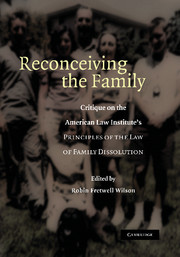 Reconceiving the Family
Reconceiving the Family Book contents
- Frontmatter
- Contents
- Acknowledgments
- Foreword, by Mary Ann Glendon
- List of Contributors
- Introduction
- PART ONE FAULT
- PART TWO CUSTODY
- PART THREE CHILD SUPPORT
- PART FOUR PROPERTY DIVISION
- PART FIVE SPOUSAL SUPPORT
- PART SIX DOMESTIC PARTNERSHIP
- PART SEVEN AGREEMENTS
- PART EIGHT JUDICIAL AND LEGISLATIVE PERSPECTIVES
- PART NINE INTERNATIONAL REFLECTIONS
- 23 Empowerment and Responsibility: The Balance Sheet Approach in the PRINCIPLES and English Law
- 24 The Past Caretaking Standard in Comparative Perspective
- 25 Compensating Gain and Loss in Marriage: A Scandinavian Comment on the ALI PRINCIPLES
- Afterword: Elite Principles: The ALI Proposals and the Politics of Law Reform, by Carl E. Schneider
- Index
24 - The Past Caretaking Standard in Comparative Perspective
Published online by Cambridge University Press: 25 January 2010
- Frontmatter
- Contents
- Acknowledgments
- Foreword, by Mary Ann Glendon
- List of Contributors
- Introduction
- PART ONE FAULT
- PART TWO CUSTODY
- PART THREE CHILD SUPPORT
- PART FOUR PROPERTY DIVISION
- PART FIVE SPOUSAL SUPPORT
- PART SIX DOMESTIC PARTNERSHIP
- PART SEVEN AGREEMENTS
- PART EIGHT JUDICIAL AND LEGISLATIVE PERSPECTIVES
- PART NINE INTERNATIONAL REFLECTIONS
- 23 Empowerment and Responsibility: The Balance Sheet Approach in the PRINCIPLES and English Law
- 24 The Past Caretaking Standard in Comparative Perspective
- 25 Compensating Gain and Loss in Marriage: A Scandinavian Comment on the ALI PRINCIPLES
- Afterword: Elite Principles: The ALI Proposals and the Politics of Law Reform, by Carl E. Schneider
- Index
Summary
The Principles advocate a radical new approach to determining parenting arrangements after separation. The central concept is found in Section 2.08: “(T)he court should allocate custodial responsibility so that the proportion of custodial time the child spends with each parent approximates the proportion of time each parent spent performing caretaking functions for the child prior to the parents' separation.” This is the “past caretaking” standard. It should be seen as a ‘standard,’ rather than a rule, since the ‘rule’ can be modified on many different grounds. The past caretaking standard is based on the concept of continuity between the intact and separated family.
The presumptive allocation of custodial responsibility that results from this assessment can be modified, but only to the extent necessary to achieve other objectives contained in Section 2.08(1). There are eight objectives in Section 2.08 and a number of exceptions provided in Section 2.11. This latter sets out a number of justifications for limiting the parental responsibility of a parent in order to protect the child, the other parent, or other member of the child's household from harm, including abuse, neglect, or abandonment of a child, domestic violence, and abuse of drugs or alcohol. Given the overlap between Sections 2.08 and 2.11, some factual circumstances may be argued on more than one ground.
The past caretaking approach is also relevant to the allocation of responsibility for making significant parental decisions.
- Type
- Chapter
- Information
- Reconceiving the FamilyCritique on the American Law Institute's Principles of the Law of Family Dissolution, pp. 446 - 471Publisher: Cambridge University PressPrint publication year: 2006
- 3
- Cited by
